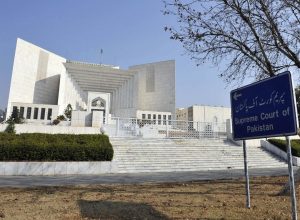CJ is in favor of the NAB adjustments being settled by parliament.
Justice Mansoor notes that the PTI has the ability to file an amendment bill in the NA.

ISLAMABAD: If the Pakistan Tehreek-e-Insaf (PTI) were to return to the National Assembly and hammer out an effective accountability law or table a bill for changes to it, the Supreme Court has expressed the hope that the disagreements over the amendments made to the National Accountability Bureau (NAB) laws could be resolved.
Following media reports that the PTI had hinted at joining the NA, the top court discussed the likelihood of the party returning to the lower house of parliament and how this could be positive for the situation.
The National Accountability (Second Amendment) Act 2022 was passed by the PDM administration after taking office in April of last year. PTI harshly criticised the action, calling the measure an effort to make NAB an ineffective organisation.
Imran Khan, the leader of the PTI, contested the NAB ordinance’s changes, claiming in a petition that they will “essentially eliminate any white-collar crime committed by a public office bearer.”
The plea was considered on Tuesday by a three-judge panel that included Chief Justice (CJ) Umar Ata Bandial, Justice Ahsan, and Justice Mansoor Ali Shah.
The chief justice opened the hearing by citing media reports about the PTI’s potential return to parliament and inquiring as to whether the government would like to meet with the PTI to discuss the important matters if the former ruling party entered parliament.
The top court has always wanted this issue to be settled in parliament, so the chief justice questioned the government’s attorney about whether his client would be open to the possibility of the legislation being returned back to parliament.
Makhdom Ali Khan, the federal government’s attorney, retorted that he was not free to remark on that without first getting permission from the government. But he went on to say that everything was spelled out in the parliamentary system, which allowed the PTI to introduce a bill for changes to NAB legislation after entering the house.
Politics are necessary for democracy to exist. A national government that was established following World War II exists as a model. No statute has ever been overturned on the presumption that lawmakers had the right intentions, he emphasised.
The attorney further recalled that no one petitioned the court when the PTI leaders received relief as a result of the NAB law modifications. A former prime minister, an ex-finance minister, and the head of an institution were accused in NAB cases but later cleared after serving lengthy prison sentences.
He asserted that NAB had previously been utilised for political engineering.
Justice Ijazul Ahsan commented at this point that the measure should be passed by consensus rather than just a simple majority in parliament. According to him, national interests should come first when considering legal revisions.
Justice Ahsan expressed optimism that legislation would be passed by agreement between the government and PTI.
He questioned whether an amnesty plan was behind the NAB amendments.
Justice Mansoor Ali Shah, speaking to PTI attorney Khawaja Haris, said the party could introduce a bill for the NAB modification in the house and questioned why it wasn’t participating in the National Assembly.
The question of whether it would be proper for the PTI to present an amendment bill to the assembly and have a discussion on it was also raised by Justice Mansoor Ali Shah.
He questioned if it would be proper for the court to broaden its purview and rule on the behaviour of lawmakers. He questioned, “Why should the court decide the case of a person who does not want to enter the parliament?
He added that Imran Khan wasn’t willing to participate in the debate in parliament or to accept its rulings. He continued, “This was causing the entire system to freeze,” and he enquired as to whether the references that were returned could not be posted in another forum.
The PTI abandoned the home due to a political choice, according to Khwaja Haris.
The federal government’s attorney responded by stating that there were additional venues for these matters throughout the nation.
He claimed that despite the court’s ruling in the GDCI case, which stated that the money collected would only be used for gas projects, the abovementioned cash vanished from the exchequer. He claimed that the money obtained through plea deals and returned to the NAB was also not placed into the national treasury.
According to CJP Bandial, the court aimed to wrap up the NAB Amendment issue quickly because it would ultimately effect how the country’s accountability laws were carried out.
“Since their incompetence is harming the accountability system, we need independent investigative officers and prosecutors. After the law’s changes, 386 references had already been returned, he said.
The judge then postponed the case’s next hearing until January 18 (today).











































